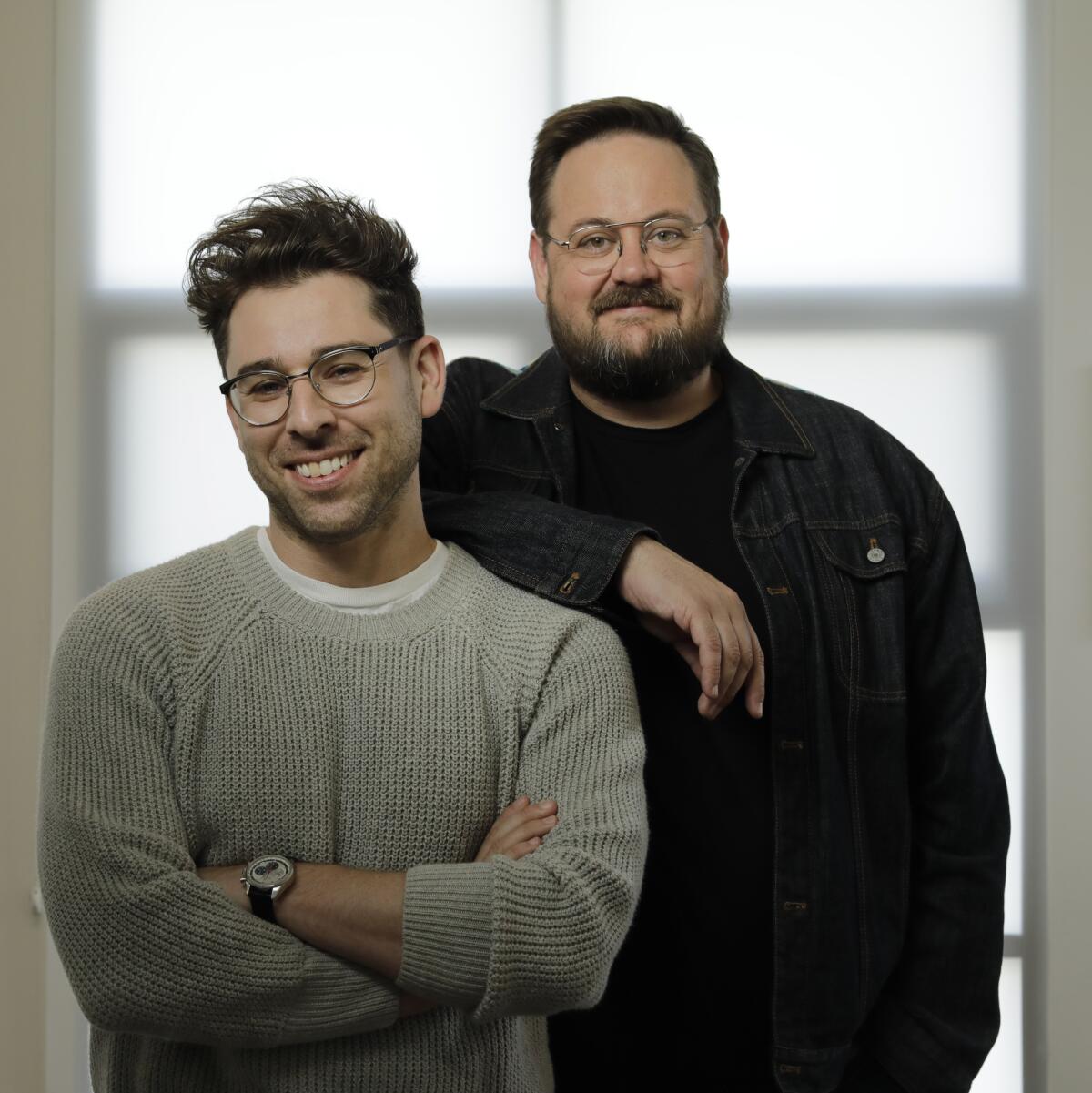The writers saw Fred Rogers as an ‘emotional archeologist.’ They unearthed ‘A Beautiful Day’

- Share via
“A Beautiful Day in the Neighborhood” began when Noah was trying to parent his extremely stubborn 2-year-old. One day, in desperation, he pulled up a YouTube clip of Fred Rogers. His daughter turned to the screen and was transfixed — listening to Mister Rogers more intently than she had ever, and would ever, listen to her dad. The next day, Noah walked into our office — by which we mean a coffee shop where we could steal WiFi — and said, “Micah, I’ve discovered a warlock who speaks toddler and we need to write about him.”
That was 10 years ago. We had no idea that it would be a full decade until we would see this movie in a theater. That stubborn toddler is now in middle school. Now Micah has a toddler of his own.
When we set out to write a movie about Fred Rogers, we realized fairly quickly that he was not an ideal subject for a conventional biopic. Honestly, he was too unwavering, too steady, too emotionally healthy. An amazing human being does not necessarily make an amazing movie.
But Fred involved himself in the lives of the people around him. He was compulsively intimate, an emotional archaeologist, and a Presbyterian minister. There were dozens of stories of people who found Fred at a low point in their life — and he helped them put the pieces back together. Tim Madigan, François Clemmons, Benjamin Wagner and, of course, Tom Junod.
We settled on our story. After a brutal negotiation, we hired ourselves to write the first draft for zero dollars. We wanted the movie to feel like an episode of “Mister Rogers’ Neighborhood” for grown-ups, about a journalist on assignment to profile Fred Rogers. We sent it to producers Youree Henley, Leah Holzer and Peter Saraf, who helped bring a director on board. It was a dream scenario. The only problem was that we didn’t have the rights.
So we all went to Pittsburgh, Fred’s home base, and sat down with Bill Isler, who ran Fred’s company for decades. He shook our hands, smiled and said that he was happy to hear what we were thinking, but that there would never, ever be a Fred Rogers movie.
We left Pittsburgh empty-handed but we didn’t give up. We stayed in contact with Bill. We begged, we cajoled, we embarrassed ourselves. And finally, he agreed. Not to give us the rights. No, he wasn’t ready to do that yet. He agreed to let us return to Pennsylvania and meet Joanne Rogers, Fred’s widow.
Making the most of a beautiful day with Mrs. Rogers. At 91, Joanne Rogers tends to the legacy of her late husband, known to generations as Mister Rogers. But she doesn’t want him put on a pedestal, even with Tom Hanks playing him in a movie, and she tells a reporter why.
She was generous with her time and spirit and answered, honestly, every question we asked. That day, for whatever reason, she agreed to trust us with her husband’s legacy. She had only one demand — that we not portray Fred as a saint. He was a real human, who struggled like we all do. His life of listening and helping others was a practice, and he worked at it every day. To think otherwise meant that his way of life was unattainable.
From there, Bill and Joanne gave us access to the Fred Rogers Archive at St. Vincent’s College in Latrobe, Pa. If we were ever going to make a Fred Rogers movie, we needed to get closer to the man himself.
It was in the archive that we found a box labeled “Tom Junod.” We knew that Tom got to know Fred over the course of writing his profile. We didn’t know that their relationship extended for many years. In the 200-plus letters they exchanged, we realized what our movie must be.
We wrote up a quick and dirty outline and sent it to Bill and Joanne. They gave us the thumbs-up. We reworked the script until we thought it was ready to go ... and then we lost our directors!
We had worked with Marielle Heller on “Transparent” and deeply loved her two features. We sent her the script. We got lucky. She came on and asked us who our ideal actor was to play Fred. Sheepishly, we said Tom Hanks. We had sent him the script before and he passed, but Marielle said, “Let me give it a shot.” She sent him the script. They spoke. As you do. To Tom Hanks.
And then, Tom Hanks was in our movie, and we lost our minds.
Ten years later, Fred has become part of our lives, not merely as the subject of our movie but a guide along the way. He helped us to be better fathers to our children. He taught us how to slow down, and be kind to others and ourselves.
But perhaps more than anything, Fred has served as a rare beacon of light in a dark time. An antiseptic for cynicism. A role model when there aren’t many to go around these days. We never expected this film to take as long as it did to come to fruition. We thought we were waiting for this moment. Maybe this moment was waiting for Fred Rogers.
More to Read
Only good movies
Get the Indie Focus newsletter, Mark Olsen's weekly guide to the world of cinema.
You may occasionally receive promotional content from the Los Angeles Times.











